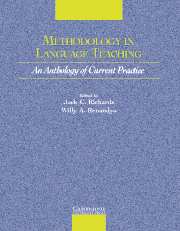Book contents
- Frontmatter
- Contents
- Acknowledgments
- Introduction
- Section I Approaches to Teaching
- Section 2 Lesson Planning and Classroom Management
- Section 3 Classroom Dynamics
- Section 4 Syllabus Design and Instructional Materials
- Section 5 Task and Project Work
- Section 6 Learning Strategies
- Section 7 Teaching Grammar
- Section 8 Teaching Pronunciation
- Section 9 Teaching Speaking
- Section 10 Teaching Listening
- Section 11 Teaching Vocabulary
- Section 12 Teaching Reading
- Section 13 Teaching Writing
- Section 14 Assessment
- Section 15 Technologies in the Classroom
- Section 16 Professional Development
- Credits
- Author Index
- Subject Index
Section 11 - Teaching Vocabulary
Published online by Cambridge University Press: 10 November 2010
- Frontmatter
- Contents
- Acknowledgments
- Introduction
- Section I Approaches to Teaching
- Section 2 Lesson Planning and Classroom Management
- Section 3 Classroom Dynamics
- Section 4 Syllabus Design and Instructional Materials
- Section 5 Task and Project Work
- Section 6 Learning Strategies
- Section 7 Teaching Grammar
- Section 8 Teaching Pronunciation
- Section 9 Teaching Speaking
- Section 10 Teaching Listening
- Section 11 Teaching Vocabulary
- Section 12 Teaching Reading
- Section 13 Teaching Writing
- Section 14 Assessment
- Section 15 Technologies in the Classroom
- Section 16 Professional Development
- Credits
- Author Index
- Subject Index
Summary
INTRODUCTION
In the past, vocabulary teaching and learning were often given little priority in second language programs, but recently there has been a renewed interest in the nature of vocabulary and its role in learning and teaching. Traditionally, vocabulary learning was often left to look after itself and received only incidental attention in many textbooks and language programs. Thus, although the course curriculum was often quite specific about aspects of teaching such as grammar, reading, or speaking, little specification was given to the role of vocabulary. The status of vocabulary now seems to be changing. For one thing, the notion of a word has been “broadened” to include lexical phrases and routines, and it has been suggested that in the initial stages of learning these play a primary role in communication and acquisition. In addition, access to lexical corpora has made it possible for applied linguists to access huge samples of language in order to find out how words are used, both by native speakers and by second language learners. Such research has enabled applied linguists to identify common patterns of collocation, word formation, metaphor, and lexical phrases that are part of a speaker's lexical competence. The papers in this section discuss the role of vocabulary in teaching and learning.
Information
- Type
- Chapter
- Information
- Methodology in Language TeachingAn Anthology of Current Practice, pp. 255 - 257Publisher: Cambridge University PressPrint publication year: 2002
Accessibility standard: Unknown
Why this information is here
This section outlines the accessibility features of this content - including support for screen readers, full keyboard navigation and high-contrast display options. This may not be relevant for you.Accessibility Information
- 1
- Cited by
